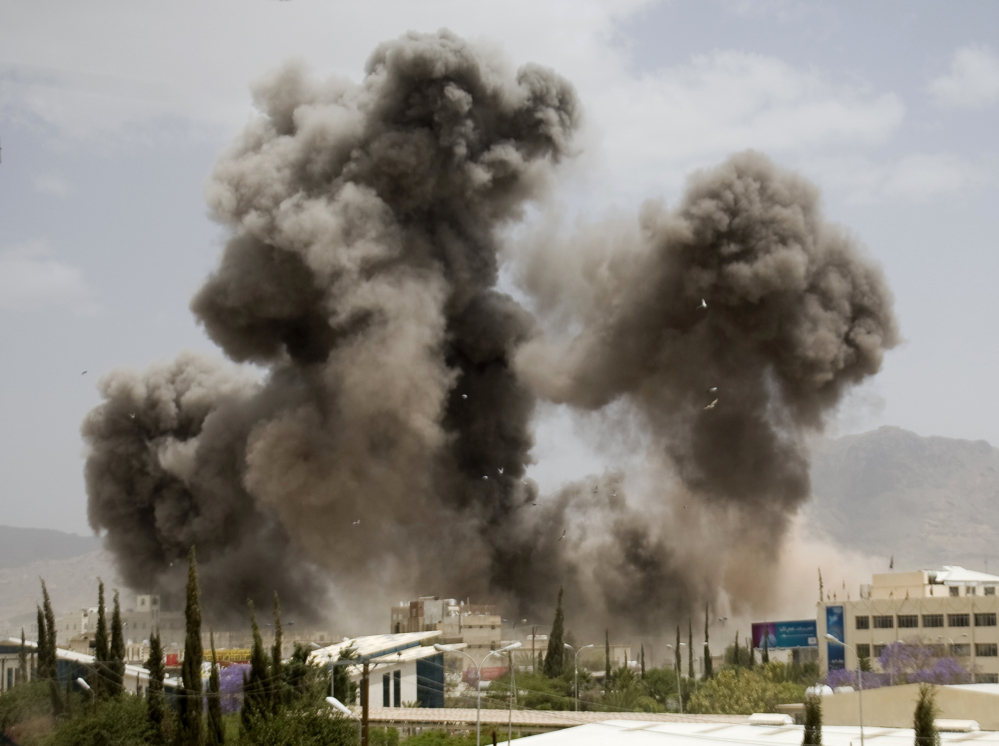BEIRUT — Two weeks into a Saudi-led military campaign in Yemen, the airstrikes appear to have accelerated the country’s fragmentation into warring tribes and militias and done little to accomplish the goal of returning the ousted Yemeni president to power, analysts and residents say.
The Yemeni insurgents, known as Houthis, have pushed ahead with their offensive and seem to have protected many of their weapons stockpiles from the coalition’s bombardments, analysts say. The fighting has killed hundreds of people, forced more than 100,000 people to flee their homes and laid waste to the strategic southern city of Aden.
The battles are increasingly creating problems that go beyond the rebels opposing President Abed Rabbo Mansour Hadi and the forces supporting him. The conflict has reduced available water and food supplies in a country already suffering from dangerous levels of malnutrition, and created a security vacuum that has permitted territorial advances by al-Qaida in the Arabia Peninsula (AQAP).
For the Saudi government and its allies, the military operation in Yemen may be turning into a quagmire, analysts say. “What’s a potential game-changer in all of this is not just the displacement of millions of people, but it’s this huge spread of disease, starvation and inaccessibility to water, combined with an environment where radical groups are increasingly operating in the open and recruiting,” said Jon Alterman, director of the Middle East Program at the Center for Strategic and International Studies.
The Yemen conflict, he added, could become a situation where “nobody can figure out either who started this fight or how to end it.”
Saudi Arabia, a Sunni powerhouse, views Yemen’s Houthi rebels as proxies of Shiite Iran. The air campaign that began March 25 is widely seen in the region as an attempt by the Saudis to counterthe expanding influence of Iran, which has gained significant sway in Arab countries like Iraq, Syria and Lebanon.
Hadi, the internationally recognized Yemeni president, was pushed out of the capital, Sanaa, in February. He then attempted to establish an authority in Aden before being forced to flee to Riyadh, the Saudi capital, last month.
In a media briefing in Riyadh this week, a Saudi military spokesman painted a positive picture of the offensive in neighboring Yemen, saying that Houthi militias had been isolated in Aden and groups of rebels were abandoning the fight. Saudi officials have argued that a two-week time frame is too short to judge the operation’s outcome and have emphasized that they are moving carefully to avoid civilian casualties.
The Saudi-led coalition, which the U.S. government supports with intelligence and weapons, consists of mostly Arab and Sunni Muslim countries, and the level of quiet coordination among their armed forces has impressed analysts. The United Arab Emirates and Jordan are believed to have joined Saudi Arabia in conducting air raids that have destroyed scores of military bases and arms depots, said Theodore Karasik, a Dubai-based analyst on Middle Eastern military issues. The Saudis also have received support from Egypt’s navy in patrolling the coast of Yemen, he said.
Still, Karasik said, Houthi rebels appear to have successfully hidden from bombardment significant stores of weapons, possibly by moving them to the insurgents’ mountainous northern stronghold of Saada. To destroy those arms and persuade the Houthis to halt their offensive and agree to peace talks, a ground attack would be required, he said.
Copy the Story LinkSend questions/comments to the editors.



Success. Please wait for the page to reload. If the page does not reload within 5 seconds, please refresh the page.
Enter your email and password to access comments.
Hi, to comment on stories you must . This profile is in addition to your subscription and website login.
Already have a commenting profile? .
Invalid username/password.
Please check your email to confirm and complete your registration.
Only subscribers are eligible to post comments. Please subscribe or login first for digital access. Here’s why.
Use the form below to reset your password. When you've submitted your account email, we will send an email with a reset code.